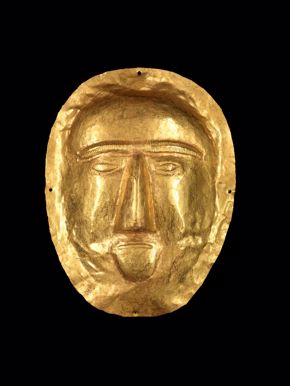Roads of Arabia: Archaeology and History of the Kingdom of Saudi Arabia December 19, 2013–March 9, 2014

Funerary Mask, Thaj, Tell al-Zayer, Saudi Arabia, 1st century BC, gold, National Museum, Riyadh.
Anthropomorphic Stele, near al-Ula, Mada’in Saleh, Tayma, Saudi Arabia, 4th millennium BC, sandstone, National Museum, Riyadh.
Head of a Man, Qaryat al-Faw, Saudi Arabia, 1st century BC–2nd century AD, cast bronze, Department of Archaeology Museum, King Saud University, Riyadh.
Part of a Horse, al-Magar, Saudi Arabia, c. 7000 BC, stone, National Museum, Riyadh.
Head of a Lihyanite Dynasty Statue, Tayma, Yard E, deposit of the ancient Temple E-b1, Saudi Arabia, 4th–2nd century BC, sandstone (restored), Tayma Museum.
Funerary Stele, Tayma, Saudi Arabia, 5th–4th century BC, sandstone, Tayma Museum.
Anthropomorphic Stele, El-Maakir, Qaryat al-Kaafa, near Ha’il, Saudi Arabia, 4th millennium BC, sandstone, National Museum, Riyadh.
Exhibition Catalogue
MFAH Shop | 713.639.7360
Roads of Arabia: Archaeology and History of the Kingdom of Saudi Arabia examines the impact of ancient trade routes that traversed the Arabian Peninsula, carrying precious frankincense and myrrh to Mesopotamia and the Greco-Roman world and allowing for a vibrant exchange of both objects and ideas. With the later rise of Islam, pilgrimage roads converged on Mecca and gradually replaced the well-traveled incense roads.
This unparalleled exhibition features objects excavated from more than 10 archaeological sites throughout the peninsula. Among the works on view are alabaster bowls and fragile glassware, heavy gold earrings, and monumental statues. These objects testify to the lively mercantile and cultural exchange between the Arabs and their neighbors, including the Egyptians, Syrians, Babylonians, and Greco-Romans.
The surprising discoveries on display in Roads of Arabia open a new window onto the culture and economy of this ancient civilization. The unprecedented assembly made its U.S. debut at the Smithsonian Institution’s Arthur M. Sackler Gallery in 2012 before traveling to the Carnegie Museum of Natural History in Pittsburgh. An earlier version of the show was exhibited in Barcelona, Berlin, Paris, and Saint Petersburg.
Opening Dinner
Wednesday, December 18
Illustrated Catalogue
Accompanying the exhibition is an illustrated catalogue, available through the MFA Shop (713.639.7360) and the Museum’s Hirsch Library (713.639.7325).
Installation Time-Lapse Video
"Roads of Arabia: Archaeology and History of the Kingdom of Saudi Arabia" is organized by the Arthur M. Sackler Gallery, Smithsonian Institution, in association with the Saudi Commission for Tourism and Antiquities of the Kingdom of Saudi Arabia. ExxonMobil and Saudi Aramco are gratefully acknowledged as principal co-sponsors of the tour of "Roads of Arabia" in the United States. Sponsorship is also provided by The Olayan Group and Fluor Corporation. The Boeing Company, Khalid Al Turki Group, and Saudi Basic Industries Corporation SABIC granted additional support.



In Houston, generous funding is provided by Mary Lawrence Porter and Oliver Wyman.
